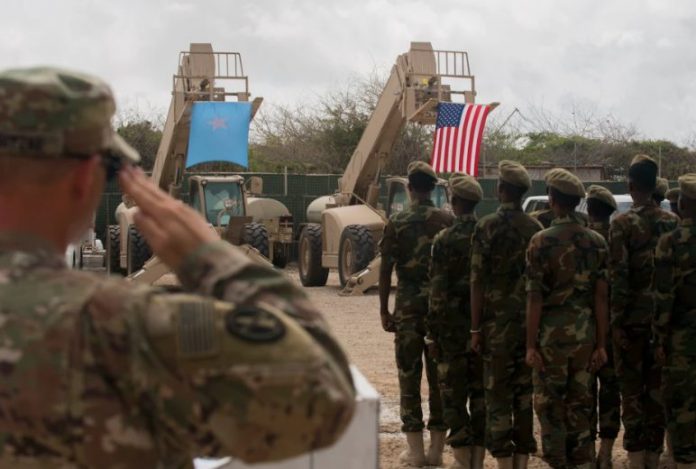Biden OKs Plan to Send U.S. Troops Back to Somalia. But the Pentagon is deploying fewer this time.
U.S. President Joe Biden has approved a Defense Department plan to redeploy American troops to Somalia to shore up counterterrorism efforts against one of Africa’s deadliest and most powerful militant groups.
Biden’s decision will send several hundred U.S. special operators back into Somalia to help the fragile Somali federal government fight off the al Qaeda-linked al-Shabab terrorist group. The decision largely reverses former President Donald Trump’s directive to withdraw some 750 U.S. troops from the East African country shortly before leaving office in January 2021, as part of his broader efforts to draw down the U.S. military’s presence abroad.
A senior Biden administration official, speaking on condition of anonymity in a briefing to reporters under ground rules set by the White House, characterized Trump’s directive as “an abrupt and sudden transition to a rotational presence” that allowed the al-Shabab terrorist group to gain further strength and step up attacks against the Somali government and civilian targets in recent years.
The senior official said “under 500” U.S. troops would be redeployed to Somalia under the new plan but did not give additional details on the troops being deployed, citing security. The United States had about 750 troops in Somalia until Trump ordered the withdrawal that took place just days before Biden’s January 2021 inauguration. Since then, U.S. troops have rotated in and out of Somalia for specific missions, which the official characterized as a difficult and inefficient system that undermines U.S. efforts to help Somalia and other partnering governments fight al-Shabab.
“Restoring a persistent U.S. military presence will help to increase the security and freedom of movement of other personnel, such as State Department and [U.S. Agency for International Development] colleagues as they conduct critical diplomatic and development missions,” the official added.
Biden also reportedly authorized the Pentagon to target top al-Shabab leaders in addition to the new troop deployment, as the New York Times reported.
The news of Biden’s decision comes after a major international anti-Islamic State coalition conference in Morocco last week, where leaders from dozens of countries warned that the terrorist group was gaining traction across western Africa even as it lost territory and influence in the Middle East. American gunsights, in contrast, are trained on the al Qaeda-linked al-Shabab in Africa’s east. Biden has authorized at least five drone strikes against al-Shabab since he took office.
Al-Shabab, considered one of the world’s deadliest terrorist groups, has claimed responsibility for a spate of attacks targeting the federal Somali government and peacekeepers from the African Union. It orchestrated the siege of a Kenyan university that killed nearly 150 people and a massive truck bombing in Mogadishu in 2017 that killed nearly 600. It was also responsible for a 2020 attack on a U.S. air base in Manda Bay, Kenya, that killed three Americans.
In 2021, after Trump’s decision to withdraw U.S. forces, al-Shabab stepped up its attacks, particularly around Somalia’s elections, and was expected to be implicated in over 2,000 violent incidents and a 28 percent increase in clashes with government security forces, according to a report last July from the Africa Center for Strategic Studies.
U.S. military officials have long believed that al-Shabab has the intent to attack the United States, though it lacks the capabilities to do so currently, and the Pentagon considers the group both the fastest-growing and most kinetically active terrorist cell on the continent.
“Deadly terrorism has metastasized to Africa,” Gen. Stephen Townsend, the top U.S. military commander in Africa, told Congress in an annual update in March. Terrorist threats on the continent, he said “remain grave and growing threats that aspire to kill Americans both there and in our homeland.”
The U.S. decision was announced shortly after Somalia’s parliament elected a new president, ending a political crisis that had kept the country in limbo for over a year. Hassan Sheikh Mohamud on Sunday was officially named president, defeating incumbent Mohamed Abdullahi Mohamed, known as Farmaajo, in three rounds of parliamentary voting.
The U.S. intelligence community’s annual worldwide threat assessment, released in February, said that the “focus on politicking” had led to government paralysis that could give al-Shabab a wider opening to gain power and undermine the government in Mogadishu.
By Robbie Gramer, a diplomacy and national security reporter at Foreign Policy, and Jack Detsch, Foreign Policy’s Pentagon and national security reporter
Foreign Policy






























